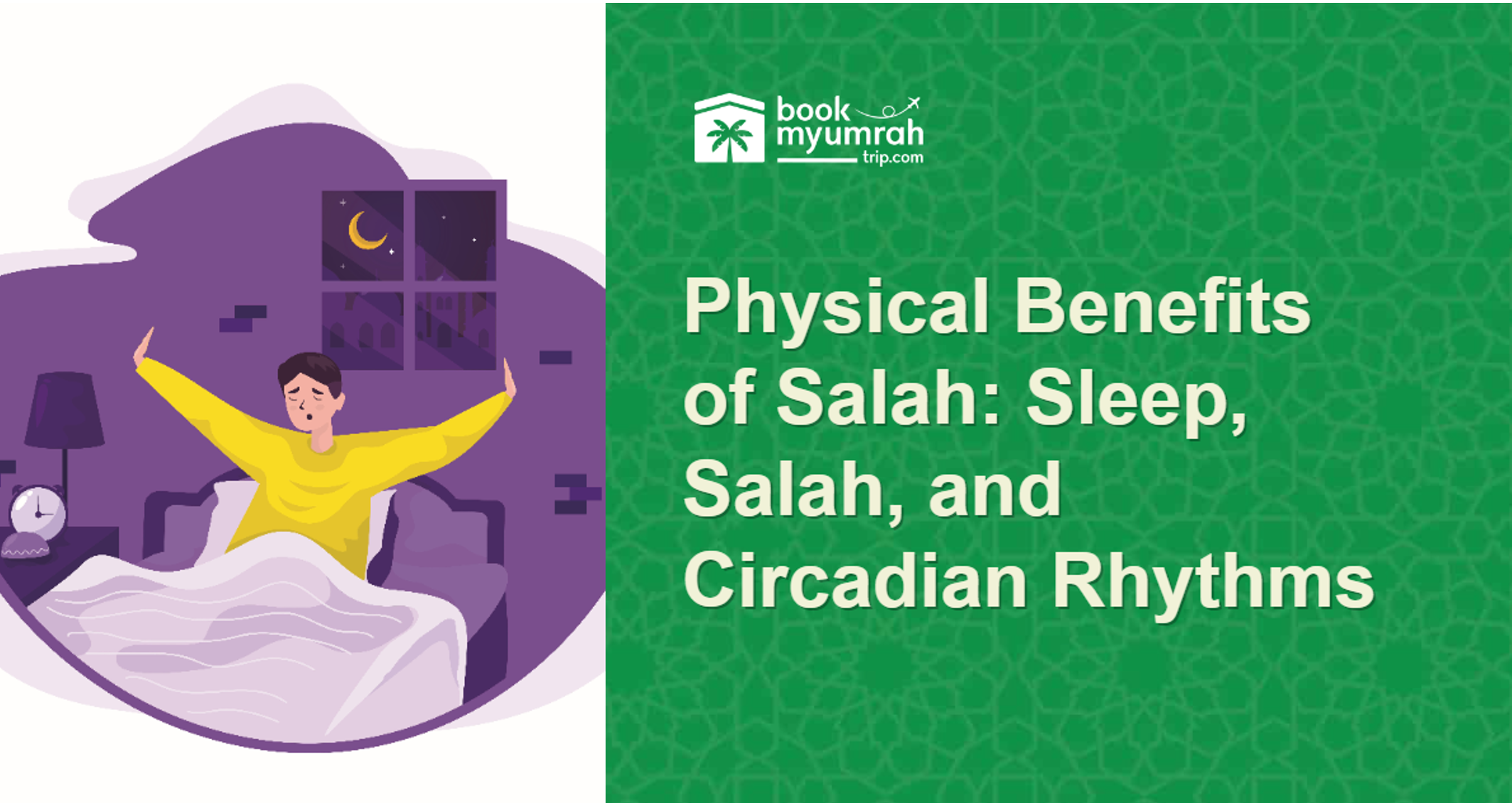Physical Benefits of Salah: Sleep, Salah, and Circadian Rhythms

Salah (the five daily prayers) is the way to the soul’s comfort for Muslims. But are you aware that it is also capable of enriching your physical health—especially sleep and internal body clock? In this blog, we’ll talk about how muslim prayer balances the circadian clock, allows better sleep, hormonal rhythm, and overall well-being.
What are Circadian Rhythms?
Circadian rhythms are a natural cycle of the body that lasts for 24 hours and regulates various functions such as temperature, sleep, hormones, and energy levels. The primary factor that influences these rhythms is light — we usually feel the most awake at sunrise and the secretion of melatonin in the evening helps the body to sleep.
Breaking this rhythm by nocturnal lifestyle, irregular feeding times, or excessive screen time can cause a shift in these rhythms resulting in tiredness, mood swings, and in some cases, even serious health complications over time.
Salah, an organised exercise, helps you avoid these mishaps.
How? According to an NIH 2025 Research says that involving yourself in religious practices tends to form a pattern and helps in improving the sleep and wake cycle.
How Salah Affects the Daily Rhythm
There are no deadlines - Five fixed prayers in the morning and evening are anchors that are akin to time posts by which the activity is controlled.
In line with the sun cycles, Fajr (dawn) and Isha (darkness) are in line with the natural light signals, which condition the body clock.
Scientific support - Research indicates that prayer has a positive effect on circadian stability, which increases hormonal balance and the quality of sleep. Even an Iranian study had discovered a healthier level of melatonin among those who observed the night-vigil prayers (JKMU, 2020).
Therefore, the Islamic prayer times are in balance with the biology of the body.
Salah & Sleep: A Two-Way Benefit
Salah benefits are always helpful in improving your quality of life and routines.
Regularity: Wake up on the Fajr and sleep at the right time. Isha creates consistent sleep habits.
Winding Up: Isha Salah is a natural nighttime ritual that helps ease your brain and body.
Stress Relief: Salah, through tranquil movements and mindful concentration, calms your nervous system, lowers stress, and allows sleep that’s deep and peaceful.
Hormonal Harmony: Consistency in Salah regulates the cortisol and melatonin rhythms, which in turn, lets your body to relax and heal through better sleep.
Greater rest in turn makes us more focused in worship-- body and soul, making the reinforcing cycle.
Sunnah Habits for Peaceful Sleep
Prophet Muhammad ﷺ followed various habits that helped him ﷺ maintain a quality pattern of sleep and wake cycles. This is how:
Not sleeping before Isha and no post-Isha talks: The Prophet ﷺ discouraged both and asked his ﷺ Ummah to maintain the night rest.
Sleeping right-side & with Wudhu: He ﷺ would do ablution (wudhu) and sleep on his right hand, saying:
“Allahumma bismika amutu wa ahya”
Translation: O Allah, in your name I shall die and live.
Motivation during Fajr: The adhan says, “Prayer is better than sleep”; a wake-up call for reward & obedience.
Not rushing Isha: Occasionally, the Prophet ﷺ delayed Isha because of better sleep later, allowing for flexibility.
Collective benefit: It’s said that the one who prays Isha and Fajr in community is rewarded as someone who had prayed the whole night. (Tirmidhi 221)
The habits create a good routine while earning you religious benefits.
Quranic Verses and Duas About Sleep
1. Sleep is mentioned in the Quran as a spiritual sign:
“And of His signs is your sleep by night and day, and your seeking of His bounty in both.” ~Qur'an 30:23
And:
“And it is He who made the night for you as covering, and sleep for rest, and the day as rising.” ~Qur'an 25:47
2. Dua before sleep:
Allahumma bismika amutu wa ahya
O Allah, in thy name I shall die and I shall live.
Repeating Ayat al-Kursi and the two final verses of Surah al-Baqarah just before sleep are also protective and relaxing to the mind—rest that directly contributes to sleep.
Real-life Advice on how to balance Salah and Sleep.
Keep up with regular sleeping/waking schedules that are grounded through Fajr and Isha.
Go out in morning sunlight after the Fajr; it elevates your circadian clock.
Cut down on nighttime screen use; blue light has a delaying effect on melatonin.
Let your room be dark, peaceful, and cool.
Take good short naps (qailulah) and focus on early afternoon for these.
By the end of the day (after Maghrib), get ready to sleep: minimize heavy chores, ease up, and pray Isha on time.
These little changes with Salah maximize health and spirituality.
Summary
Salah is not merely spiritual, but it is the way of life that promotes physical fitness and health balance in everyday living. The Islamic prayer times are thus natural time markers, and they assist the human body in aligning with the rising and setting of the sun.
Modern science keeps coming to reason with Islamic teachings, which were outlined in the book around 1,400 years ago, that through worship, a person acquires full well-being. May Allah make us consistent in prayer and give us calm sleep as a gift. Ameen.
FAQs
1: Does waking up for Fajr impair the quality of sleep?
Not when bedtime was earlier. It literally levels your heart rate and increases morning productivity.
2: Is Tahajjud able to cause normal sleep?
If done excessively, yes. Moderate night prayer can, however, make circadian health and mental tranquility better.
3: Does the midday nap Sunnah have a health benefit?
Yes, a brief sleep (20-30 minutes) before or after Dhuhr makes one fresh without taking away night sleep.


